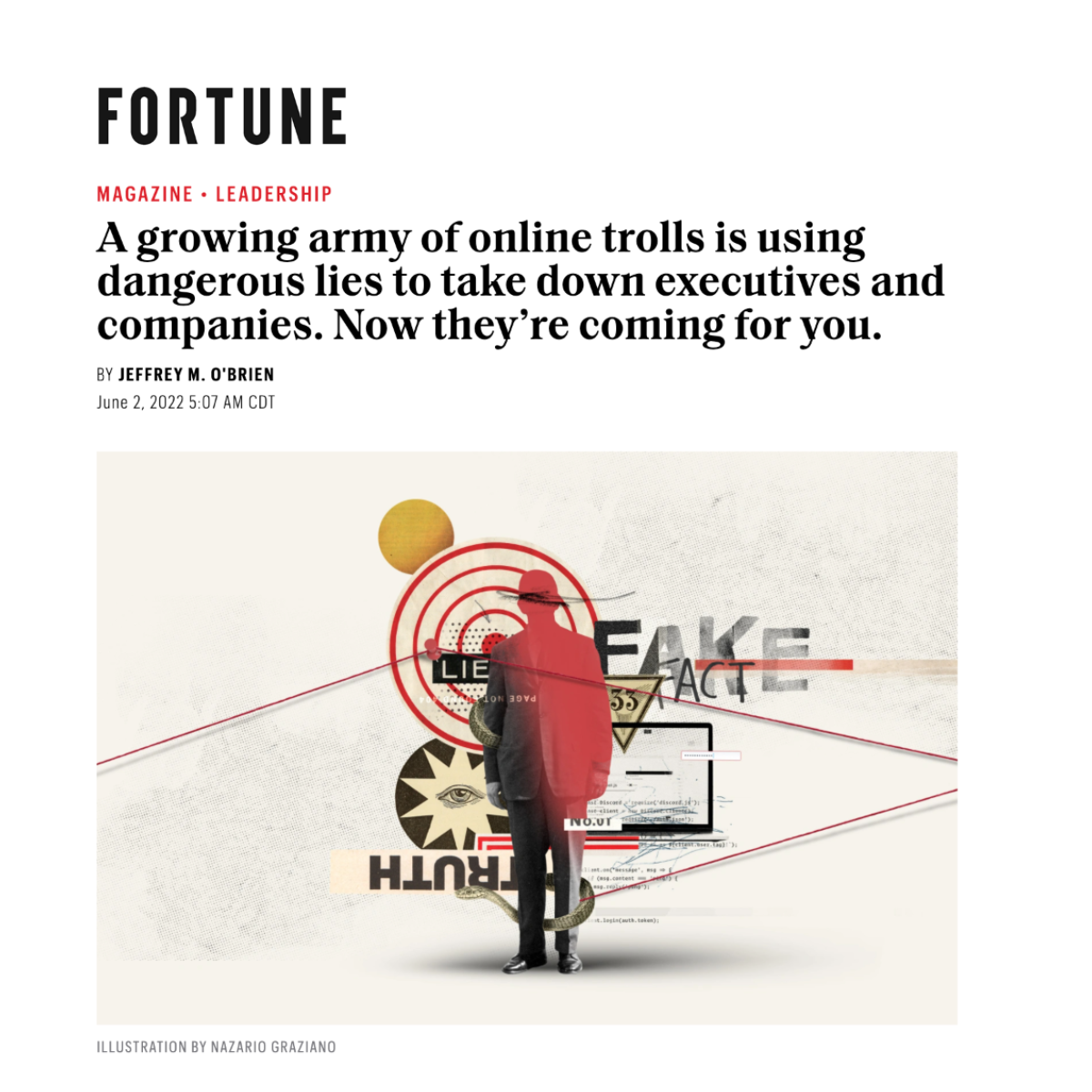
Sign up for Powell Tate Insights for monthly fresh takes on disruptions, innovations and impact in public affairs.
Chaos, confusion, and conflict are defining traits in media now and for the foreseeable future. Corporate world, take notice. Primarily seen as a political or health concern, signs show misinformation, extreme polarization, AI-generated language/images, and rampant ad fraud must be taken more seriously by all business leaders.

In this month’s Fortune 500 Issue, Jeff O’Brien published a series of in-depth stories about information risks posed to Moderna, The World Economic Forum, and corporate America writ large. Over six months of reporting he found growing evidence of, in his words, an “army of trolls using information to take down companies and executives.”
Speaking with O’Brien about the assignment, he said it was one of the most challenging, and one of the deepest investigations of his career covering technology at Wired and Fortune Magazine. There was so much to cover, so many different trails, so many rabbit holes that much of his reporting didn’t make the cut. That’s saying something for a piece that came in at more than 7,500 words.

Jeff O’Brien featured Weber Shandwick’s Media Security Center in his in-depth story about the growing threat of disinformation – and how corporations are fighting back.
Despite increased awareness, ownership of this issue is often unclear, putting companies at even greater risk. Consider these excerpts:
“They’re a decentralized cabal of grifters, mercenaries, profiteers, politicians, think tanks, activists, and nation-states. Their motives are varied: market manipulation, wealth, attention, power, even systemic destruction. With a legion of malcontents and trolls at their disposal, they goose stock prices, rankle executives, sway policies, and, perhaps more than anything else, sow confusion about right and wrong, real and fake, truth and lies. They’re bent on making you doubt your own eyes, ears, and instincts. And they’re winning.”
“There’s a staggering opportunity to inflict damage on companies through narrative combat — in part because the typical enterprise is woefully unprepared to defend itself. It’s difficult to identify sources of misinformation (false perceptions) and disinformation (the willful, systematic spread of lies), and even harder to track momentum. There is no department to handle damaging memes when they achieve escape velocity. Vitriol and lies can be matters for brand reputation, PR, or crisis comms. But they can also invoke IT, HR, legal, risk management, and security. Which means they’re everyone’s problem—and no one is responsible.”
“The optimistic take says the battle will evolve along the lines of cyberwarfare. We’ll build a robust line of defense in the same way we protect ourselves against hackers. We’ll develop experts, form corporate departments, and establish clear reporting lines. We’ll create best practices and spend a lot of money to, if nothing else, ensure the survival of the social structure that enables businesses to thrive.”
After tracking and covering information conflict since 2018, Weber Shandwick framed the business challenge and new category of work as Media Security. We backed it with a consultative service in partnership with Blackbird.AI to help our teams and clients navigate growing threats.
Six months later, this work is even more foundational for dealing with a media environment that is sustaining increased pollution by bad actors. It requires narrative forensics, upstream research, strategy, scenario planning, downstream message testing, targeting, and measurement. Our job is to lead, understand, and to get to the issues first — critical territory for anyone in the communications business.
I guess you could say there’s “hope” that mainstream visibility means information disorder is now recognized for the threat it is. But recognition alone is a lost cause.
To face the challenge, now it’s time for action.
This article was originally posted on Media Genius.

Sign up for Powell Tate Insights for monthly fresh takes on disruptions, innovations and impact in public affairs.
Managing risk & reputation in an election year
Throughout the course of the 2024 election cycle, our Global Elections Task Force has been providing data-driven election insights, analysis, and real-time counsel to our team and clients. Get timely insights on our Election Matters home page.